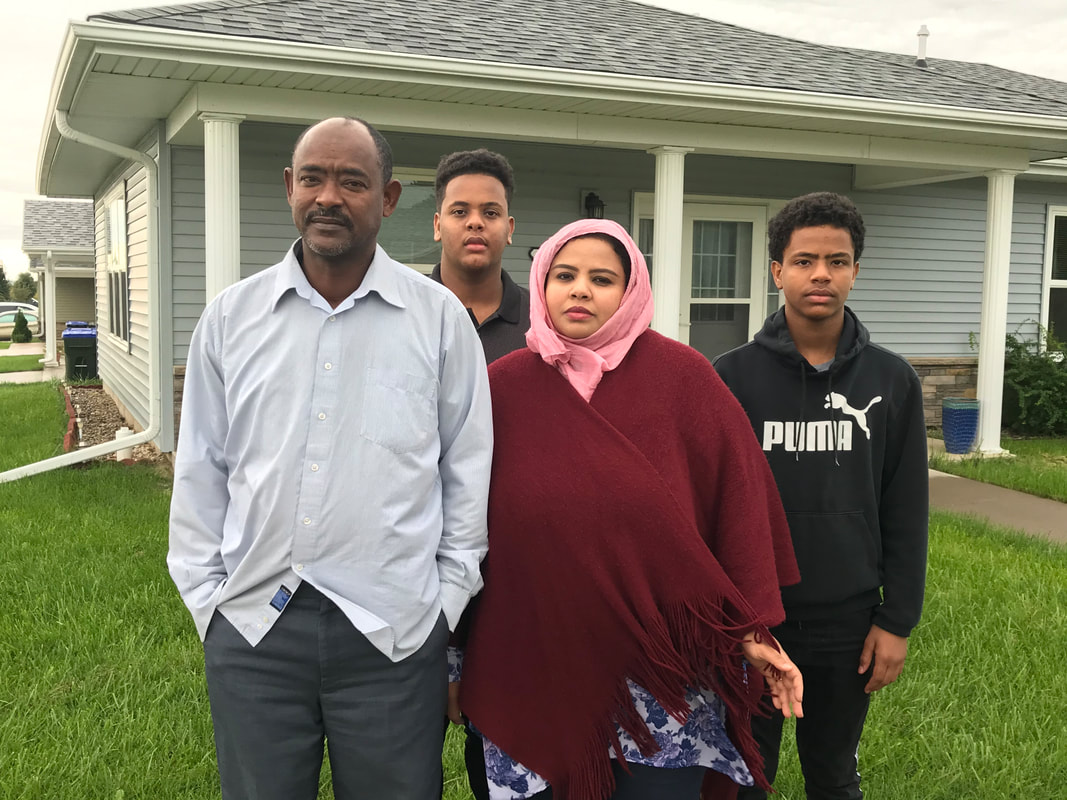Kindergartner Moneeb looks forward to a good night’s sleep in the new Habitat house he will soon be living in. His family of eight is sharing a small house and it can be hard to get to and stay asleep when sharing a bedroom with multiple siblings. “Someone is always talking instead of going to sleep, and I get tired at school,” says Moneeb. There are 6 children in this family including Nadeen, Mohammed, Ahmed, Mohalab, Mustafa, and Moneeb.
The family will build their new home with Iowa Valley Habitat for Humanity and will be able to move in at the end of the year. Mogahid and Rahma, Moneeb’s parents, say they are currently paying $1,900 monthly rent and can’t afford a rental home large enough for their family. Renting has also meant frequent moves and the couple fears their landlord will raise their rent or sell the house.
“It’s important to own a home because rent is higher than a mortgage, “ Mogahid says. “If we pay a mortgage, the home is ours. Renting a house means the home is not ours. We feel like we are losing money.”
The couple, who moved to Iowa in 2014 through the Diversity Visa Program, say they were happy in Sudan and miss their family, but wanted their children to have educational opportunities unavailable in their home country. Mogahid, who was a civil engineer in Sudan, has a master’s degree in environmental science and currently works for a trucking company. Rahma is studying ESL and busy taking care of their home and transporting their children to school and activities.
Mogahid is happy he will contribute to the construction of his own home and is benefiting greatly from Habitat’s financial literacy and homeowner education courses. “I have learned how to get homeowner’s insurance, how to budget to pay a mortgage and ways to save money on repairs,” says Mogahid. Rahma is volunteering in the Habitat ReStore and the children designate a part of their allowance as a donation to a community organization.
Nadeen, a high school junior, says she likes living in Iowa because of the people and the schools and is happy to have a good education, although she dislikes the winter cold and misses her family in Sudan. “My main hope is this new house means we will get to stay in one place and will not have to move again,” she says.
-Story written by Diana Russo
The family will build their new home with Iowa Valley Habitat for Humanity and will be able to move in at the end of the year. Mogahid and Rahma, Moneeb’s parents, say they are currently paying $1,900 monthly rent and can’t afford a rental home large enough for their family. Renting has also meant frequent moves and the couple fears their landlord will raise their rent or sell the house.
“It’s important to own a home because rent is higher than a mortgage, “ Mogahid says. “If we pay a mortgage, the home is ours. Renting a house means the home is not ours. We feel like we are losing money.”
The couple, who moved to Iowa in 2014 through the Diversity Visa Program, say they were happy in Sudan and miss their family, but wanted their children to have educational opportunities unavailable in their home country. Mogahid, who was a civil engineer in Sudan, has a master’s degree in environmental science and currently works for a trucking company. Rahma is studying ESL and busy taking care of their home and transporting their children to school and activities.
Mogahid is happy he will contribute to the construction of his own home and is benefiting greatly from Habitat’s financial literacy and homeowner education courses. “I have learned how to get homeowner’s insurance, how to budget to pay a mortgage and ways to save money on repairs,” says Mogahid. Rahma is volunteering in the Habitat ReStore and the children designate a part of their allowance as a donation to a community organization.
Nadeen, a high school junior, says she likes living in Iowa because of the people and the schools and is happy to have a good education, although she dislikes the winter cold and misses her family in Sudan. “My main hope is this new house means we will get to stay in one place and will not have to move again,” she says.
-Story written by Diana Russo







